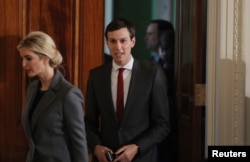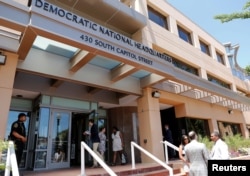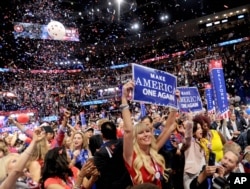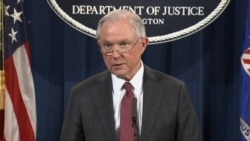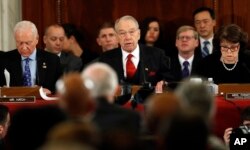President Donald Trump's administration continues to grapple with new revelations of previously undisclosed meetings with Russian Ambassador Sergei Kislyak, following U.S. Attorney General Jeff Sessions' admission that he met twice with Kislyak during last year's presidential campaign and failed to disclose those talks during his Senate confirmation hearing,
Sessions said Thursday he would stay out of any federal investigation of alleged Russian meddling into the 2016 presidential election. He said no one should see his decision as confirmation that any probe is currently underway.
President Trump and White House officials, however, also must contend with the fallout from meetings the Russian ambassador held at Trump Tower in New York in December with Trump's son-in-law, Jared Kushner, and with since-ousted national security adviser Michael Flynn.
Flynn was fired after just 24 days on the job when information emerged that he had lied to top officials about the nature of his conversations with Kislyak.
While House spokeswoman Hope Hicks said Thursday the purpose of the meetings at Trump Tower was to "establish a line of communication" between the incoming administration and the Russian ambassador. Such meetings are common, she contended, and added that Kushner also met with representatives of as many as two dozen other countries.
Asked Friday why the Trump Tower meeting was just recently disclosed, White House spokesman Sean Spicer said "this wasn't a secret. It was just ... frankly, I didn't know about it, and so I don't think anybody saw it as a big deal. There was no policy discussion."
Asked about reports that Kislyak escaped reporters' notice by using a less visible entrance to Trump Tower, Spicer's deputy, Sarah Sanders, said she was unsure whether that was correct, but would look into it.
Repeated denials
U.S. government officials meet with representatives of foreign governments on many occasions and for many reasons, but the Trump administration had denied for months there was any contact between Russian officials and the new president's campaign.
Noting that only Russia is accused of hacking into Democratic Party emails in an effort to help Trump defeat Hillary Clinton in the November U.S. election, U.S. Senator Richard Blumenthal, said Friday Sessions should be questioned once again by the Senate Judiciary Committee, which first reviewed his appointment as attorney general over his failure to disclose the meetings.
"He certainly made a seemingly false statement," Blumenthal said in an interview (MSNBC television). "I'd like him to explain what was said."
Two congressional investigations into Russia's meddling in the election are underway, and the FBI is conducting its own probe. However, the top Democrat on the House Intelligence Committee, which is conducting one of the probes, has accused James Comey, director of the Federal Bureau of Investigation, of withholding information.
"In order for us to do our investigation in a thorough and credible way, we're going need the FBI to fully cooperate, to be willing to tell us the length and breadth of any counterintelligence investigations they are conducting," Congressman Adam Schiff told reporters after a committee briefing with Comey on Thursday.
Schiff suggested the Justice Department led by Attorney General Sessions, which oversees the FBI, could have advised Comey to withhold information: "It was unclear whether that decision was a decision he was making on his own or a decision he is making in consultation with the Department of Justice." There was no comment from the FBI about Schiff's remarks.
RNC encounters
Meetings between Ambassador Kislyak and Trump's campaign also occurred during last July's Republican National Convention, at a time when campaign officials were working behind the scenes to ensure the Republican Party's policy platform did not propose sending weapons to Ukraine to defend itself from Russian and rebel forces.
The USA Today newspaper reported Thursday that two Trump campaign national-security experts met with Kislyak at the convention in Cleveland.
Sessions said Thursday his first of two meetings with Kislyak took place at the convention, where he and Kislyak talked about terrorism and Ukraine. He described the meeting as "testy" at one point, during a discussion of Russia's involvement in Ukraine.
Sessions said the second meeting with the ambassador occurred at his Capitol Hill office in September and was part of his job as a member of the Senate Armed Services Committee. However, questions have lingered about whether Sessions and the ambassador discussed the political campaign.
Several other members of the Armed Services Committee said they never met with the Russian ambassador and could not imagine a reason for doing so, since diplomatic contacts between foreign ambassadors and U.S. senators normally go through the Senate Foreign Relations Committee.
The controversy has prompted some Democrats to call for Sessions' resignation because they believe he lied during sworn testimony at his confirmation hearings.
WATCH: Sessions on contact with Russian officials
"An honest man"
President Donald Trump, who earlier Thursday said he does not think Sessions should recuse himself, called his attorney general "an honest man" who could have stated his response at the hearing more accurately.
"The Democrats are overplaying their hand. They lost the election and now they have lost their grip on reality. It is a total witch-hunt," the president's statement said.
At Sessions' January 10 confirmation hearing, Democratic Senator Al Franken asked what Sessions would do if evidence surfaced that anyone in the Trump campaign communicated with the Russian government.
"I'm not aware of any of those activities," Sessions replied. "I have been called a surrogate a time or two in that campaign and I didn't have, did not have communications with the Russians, and I'm unable to comment on it."
He told the reporters Thursday he never had any intention to mislead anyone and that his answers were "honest and correct" as he understood the question at that time.
But he said "in retrospect, I should have slowed down and said "but I did meet one Russian official a couple of times. That would be the ambassador."
The attorney general is the top law-enforcement officer in the United States. The White House and Republicans have accused Democrats of playing politics with the issue.





